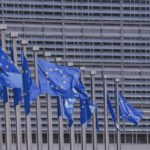The European Union is a project of the elites. Members of these elites who either are members of the European Parliament or hold posts in the commissions are also members of their respective political parties, which means that to all intents and purposes the EU is pursuing policies that those parties advocate and endorse. Never mind voters, never mind citizens who show up at referendums and defy the party line, which is by the way why, James Madison, one of the founding fathers of the American Constitution, said that the minority of the opulent must be protected against the majority.1)Federalist No. 10, Wikipedia 30.01.2017.
The European Union does its best to discourage its citizens from any participation in the political process. To the common man the Union appears to be a maze where decisions are taken partly by governments of the member states, partly by the EU commission, and partly by the EU Council, let alone Brussels, Paris and Berlin, and to top it all, in the event that something flounders, no one is held responsible. The gap between the various institutions and citizens is increasingly widening also because the elites are separating themselves from the man in the street, and do not wish the French and Dutch nationals or Catalan separatists would come to power. The EU citizens cast the ballot in an attempt to express their protest, which is, however, to little avail. They might as well tear the ballot papers to pieces, especially when very important EU matters are at stake, since their opinion is not reckoned with, which the record of the referendums for the last several years shows.
At a 1992 La Rochelle meeting Chancellor Kohl and President Mitterand were pleased with the course of events that the European Union had been following; the latter politician stressed that the time had come for the European Union to be enlarged. When, however, the French and Danes were allowed to vote over the Maastricht Treaty, the EU leaders were in for a big surprise: the Danes opposed the centralization made in Brussels. The decision that this small country took against the centralized Moloch was but a natural response: the 3,5 million strong nation could easily lose its sovereignty and identity.
This was not to the liking of the Eurocrats who resorted to judicial tricks and made the Danes vote a second time, submitting to the vote a Hamletian question of “do you, dummies, want to be a part of the Union or not?” And so the Danes were compelled to give their approval. And though in France the referendum held on 20 September 1992 yielded 51,05% in favour and 48,95% against, the ballot changed the country and scepticism towards the Europe of economic liberalism has been felt there ever since.
As Europe was unifying, new regulations were imposed complete with the most important of them all: the European Constitution. This time the snobbish minority in Brussels preferred not to risk another referendum in Denmark, though they had to risk one in Ireland, as the Irish constitution contains a provision that so important treaties must be legalized in this way (quite contrary to what we have in Germany, where such referendums are not envisaged by the Constitutional Law). In 2001 the Irish rejected the Treaty of Nice. What did the bureaucrats do then? They couched the old provisions as new and attempted to sell them to the Irish as the Treaty of Lisbon, which in 2008 was also voted against. Günther Verheugen is quoted to have said then, “A referendum held in a single member state should not be allowed thwart the most important project, which is to unite Europe politically and economically.“2)No to nice, Jungle World Nr. 25, 13.06.2001 .
The EU politicians and those from the Irish conservative party created a scary mood that was reinforced by the financiers in an attempt to have the referendum repeated in 16 months and induce the voters to say yes, which was duly achieved. This did not by any means imply that the process of ratification came to an end; it dragged, unwanted by the citizens, much longer.
To give another example: in 2015 the Greeks rejected the Troika dictate with an overwhelming majority, but a few weeks later more pressure was exerted by Brussels, banks and financial tycoons, who in the meantime craftily morphed into the European quadriga, which is enforcing disastrous condition on Greece. And just like in the case of Ireland, a mere threat that subsidies, bail-outs and similar measures which burdened other Europeans enormously, would be cut off was enough.
Another ‘no’ was condemned and reprehended. In the spring of 2016 the Dutch voted against an association treaty between the EU and Ukraine. The Brussels defenders of democracy, therefore, came to the conclusion that asking the opinion of the people was of no use. “If you want to cause damage to Europe, then hold a couple of more referendums”3)Luxemburgs Außenminister warnt vor weiteren Referenden, welt.de 09.04.2016.said the Luxembourgian foreign minister, which struck familiar chords with the president of the Greens, who said “Referendums as an element of European politics […] can threaten the very existence of the EU”.4)EU-Politiker kritisieren nationale Volksabstimmungen, ZEIT ONLINE 08.04.2016.
Was it not again James Madison, who said: „The truth is that all men having power ought to be mistrusted“?5)James Madison, Wikiquote.
References
| 1. | ↑ | Federalist No. 10, Wikipedia 30.01.2017. |
| 2. | ↑ | No to nice, Jungle World Nr. 25, 13.06.2001 . |
| 3. | ↑ | Luxemburgs Außenminister warnt vor weiteren Referenden, welt.de 09.04.2016. |
| 4. | ↑ | EU-Politiker kritisieren nationale Volksabstimmungen, ZEIT ONLINE 08.04.2016. |
| 5. | ↑ | James Madison, Wikiquote. |




